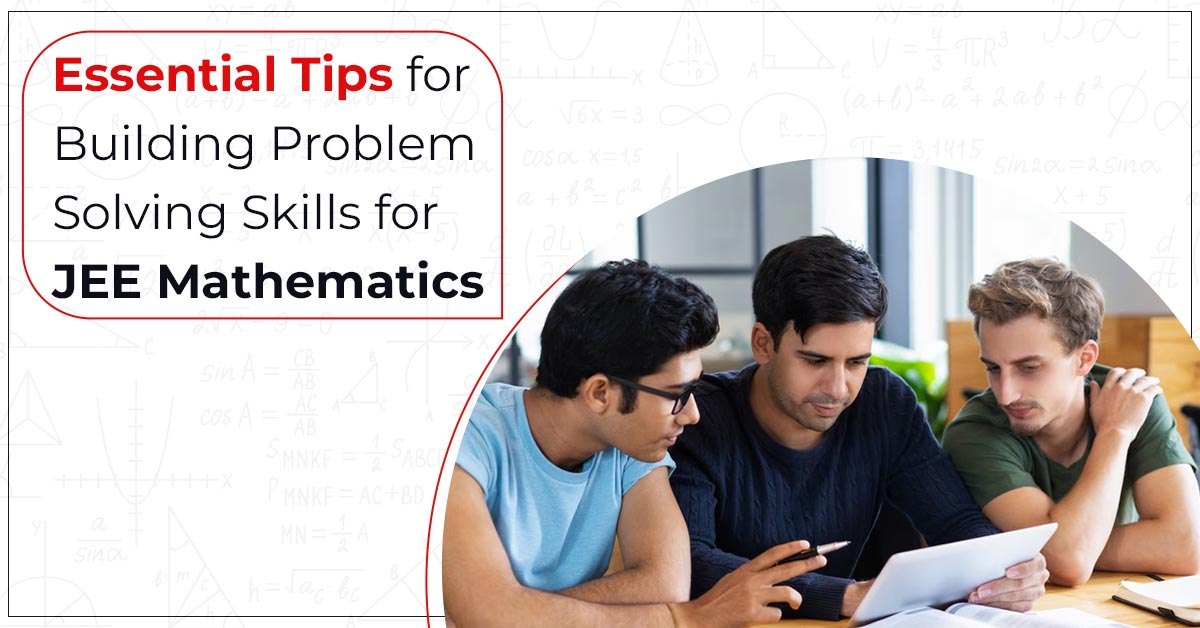Preparing for the Joint Entrance Examination (JEE) Mathematics section requires more than just understanding formulas and theories; it demands a high level of problem-solving skill. For many students, mathematics can feel overwhelming, yet with effective strategies and structured practice, tackling complex problems becomes manageable and even enjoyable. This guide provides valuable tips to enhance your problem-solving skills, which are crucial to excel in JEE Mathematics.
1. Develop A Solid Foundation In Core Concepts
Before diving into advanced problems, ensure a strong understanding of basic concepts, especially in areas like algebra, calculus, and trigonometry. JEE Mathematics questions often test foundational knowledge in unexpected ways, so a comprehensive grasp of these areas is key. Reviewing NCERT textbooks and other recommended resources helps build this base.
2. Practice, Practice, Practice
For JEE Mathematics, there’s no substitute for consistent practice. Daily practice solidifies your understanding and hones your ability to solve problems quickly. Start by solving problems at the end of each chapter, gradually progressing to more complex problems. Online resources, mock tests, and coaching materials from NEET coaching centres in Chennai can also supplement your practice and provide a structured approach to problem-solving.
3. Understand And Analyze The Problem
When you first encounter a problem, resist the urge to jump straight into solving it. Spend time analyzing what the problem is asking and identify the concepts it involves. This approach allows you to visualize potential solutions before committing to a specific method.
Many of the top 10 NEET coaching centres in Chennai teach students to dissect problems before solving them, a technique that enhances accuracy and minimizes errors.
4. Focus On Weak Areas
Regularly assess your strengths and weaknesses by taking practice tests and solving a diverse range of problems. If calculus is challenging, allocate more study time to it, ensuring that you gradually turn weaknesses into strengths. One of the ways to accomplish this is by revisiting difficult topics periodically and solving additional problems on those topics until you feel confident.
5. Learn And Practice Different Techniques
Different problems require different strategies. For example, some problems may be better solved through substitution, while others are more manageable with graphical analysis. Familiarize yourself with multiple solving techniques by practicing diverse problems. Knowing multiple approaches helps you tackle questions efficiently in the exam, where time is of the essence.
6. Time Management And Speed Practice
Speed and accuracy are critical in JEE Mathematics. Use timed practice sessions to simulate the exam environment and improve your efficiency. Begin by solving problems without a time constraint, focusing solely on understanding the methods. Once you are comfortable, set a timer and aim to solve problems more quickly. This practice helps balance both accuracy and speed.
7. Use Error Analysis As A Learning Tool
After solving problems, especially practice tests, review every error. Error analysis is a powerful tool that helps you understand your mistakes, recognize patterns, and avoid similar errors in the future. Successful coaching centers like the best neet coaching centre in chennai often emphasize error analysis as a part of effective problem-solving.
8. Refer To Quality Study Materials And Test Series
A well-structured test series and access to high-quality study material play a significant role in developing problem-solving skills. Consider enrolling in reputed programs or taking test series from NEET Coaching Centres that cover JEE-level problems. These materials are specifically designed to challenge students and reinforce concepts through rigorous practice.
9. Stay Positive And Persistent
Mathematics is a subject that requires resilience. It’s normal to encounter problems that seem difficult or take longer than expected. Maintaining a positive mindset and staying persistent are essential. Celebrate small achievements, like mastering a concept or solving a challenging problem, to keep your motivation high throughout your preparation journey.
Developing problem-solving skills for JEE Mathematics is a gradual process, requiring consistent effort and patience. With these tips and a focused approach, students can build the skills necessary to approach complex problems with confidence.
By adopting these strategies, you will improve your problem-solving abilities, making the JEE Mathematics section not just achievable, but rewarding.

